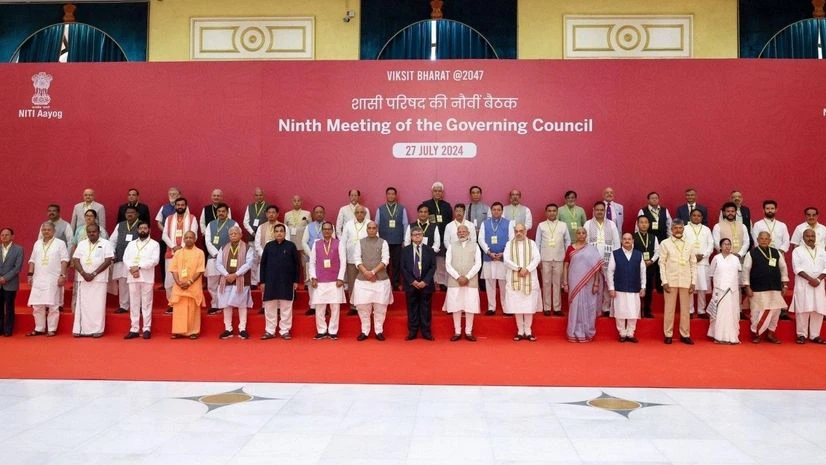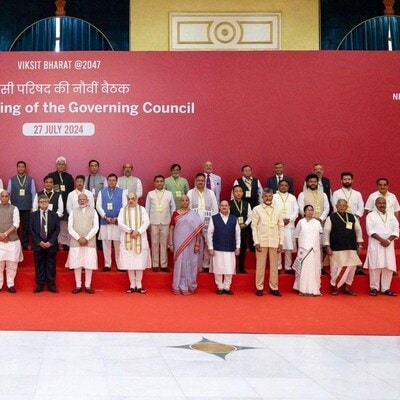)
9th Governing Council Meeting of NITI Aayog which was attended by Chief Ministers/Lt Governors representing 20 States and 6 UTs. (Pic: Ministry of Information and Broadcasting)
Emphasising the need for the states to attract foreign direct investment (FDI) at a time when there is tremendous goodwill for India worldwide, Prime Minister Narendra Modi on Saturday asked the NITI Aayog (National Institution for Transforming India) to frame an ‘investor-friendly charter’, or an index, to rank the investor friendliness of the states.
At the ninth meeting of the NITI Aayog Governing Council, held at Rashtrapati Bhavan Cultural Centre, the PM said the states could look at creating ‘river grids’ at the state level for effective utilisation of water resources. He suggested the goal of ‘zero poverty’ as a priority for a Viksit Bharat by 2047.
The meeting was attended by chief ministers and lieutenant governors of 20 states and six Union Territories (UTs). There were ten absentees, including the CMs of the states that INDIA bloc parties rule, who “boycotted” it to protest the “discriminatory” Union Budget for FY25.
For the first time, officials said, the CMs also suggested that planners should relook at India’s demographic management, especially in the context of several states set to witness a decline in their respective working age populations. It was pointed out that most states, including those in the south, have already reached the total fertility rate (TFR) of 1.6, and are looking at a scenario of managing an ageing population in the decades to come, which would require “demographic management”. The PM “encouraged states to initiate Demographic Management Plans to address the issues of population ageing in future,” an official statement said.
In his remarks, the PM spoke of the importance of skilling and training youth to make them employment-ready since the world is looking favourably towards India for a skilled human resource. He asked the Aayog to prepare an ‘investment-friendly charter’ of parameters which would include policies, programmes, and processes to be put in place for attracting investments.
The NITI Aayog meeting was held to seek the views of the states and UTs on preparing the ‘Vision for Viksit Bharat in 2047’. The ‘approach paper’ observed that the Indian economy, to become a developed nation, needed to strive to be a $30 trillion economy by 2047 with a per capita income of $18,000 per annum. The gross domestic product (GDP) would have to grow nine times from today’s $3.36 trillion and the per capita income would need to rise eight times from today’s $2,392 per annum.
Of the 36 states and UTs, chief ministers of ten states were absent from the meeting, including some who excused themselves because of commitments in their respective states, such as Bihar CM Nitish Kumar. Congress CMs of Telangana, Himachal Pradesh, and Karnataka boycotted the meeting.
NITI Aayog officials said the Kerala CM had earlier conveyed his inability to attend. Jharkhand’s Hemant Soren and his Puducherry counterpart dropped out at the last minute, officials said. Punjab’s Bhagwant Mann, Tamil Nadu’s MK Stalin, and Delhi also boycotted the meeting.
The highlight of the afternoon session was West Bengal CM Mamata Banerjee “walking out” of the meeting alleging that her speech was cut short. However, Finance Minister Nirmala Sitharaman, and later in the day, NITI Aayog Chief Executive Officer (CEO) BVR Subrahmanyam disputed Banerjee’s version of events.
Banerjee said she walked out of the meeting as Andhra Pradesh CM N Chandrababu Naidu was allotted 20 minutes for his speech, while the chief ministers of Assam, Goa, and Chhattisgarh, all BJP-ruled states, spoke for 10-12 minutes. “I was stopped after just five minutes. This is unfair,” she told reporters. She alleged that the Budget for FY25 has “deprived Bengal” and several other states. “I spoke on behalf of all the states that have been deprived. I asked the Centre to treat all states equally,” Banerjee said, reiterating her demand that the NITI Aayog should be scrapped as it is not empowered to allocate funds.
Tamil Nadu CM Stalin expressed solidarity with Banerjee. Congress’ Jairam Ramesh said NITI Aayog, in its ten years of existence, has been adjunct to the Prime Minister’s Office and a “drumbeater” of the PM. He said the Aayog has not furthered the cause of cooperative federalism in any manner and its functioning has been blatantly partisan. In his tweet on X, Ramesh said the Aayog’s meetings are a farce and its treatment of Banerjee is unacceptable.
Replying to Ramesh on X, FM Sitharaman said the West Bengal CM spoke beyond her allotted time. A few other CMs spoke beyond their allotted time, which was allowed without any fuss and no microphones were switched off, particularly not of the Bengal CM. “Mamata ji has chosen to spread falsehood. I was happy she attended. Was happier when she said she is speaking for Bengal and in fact for the entire opposition. I may agree or disagree with what she had to say. But now with her saying baseless things outside, I can only conclude that she is making an effort to keep the INDI alliance happy,” Sitharaman replied to Ramesh on X.
In a critique of the PM’s speech, Ramesh said before encouraging foreign direct investment, India needed to trigger a fresh spurt of domestic investment, which marked the Manmohan Singh decade. “You boost DI (domestic investment), and FDI will follow,” Ramesh said. He said FDI has been sluggish since 2014 because of erratic policymaking, senseless demonetisation, the botched goods and services tax, cronyism, and “raid raj” of central probe agencies.
Addressing reporters after the meeting, NITI Aayog CEO Subrahmanyam said Banerjee had requested that she had to leave early and that she be allowed to speak much earlier than the alphabetical order would have allowed. The Aayog acceded to her request. He said every chief minister was allowed seven minutes to speak after which Defence Minister Rajnath Singh would tap his table to signal that their allotted time was over. She did not seek additional time to speak. The West Bengal chief secretary continued to attend the meeting, Subrahmanyam said.
First Published: Jul 27 2024 | 9:02 PM IST
